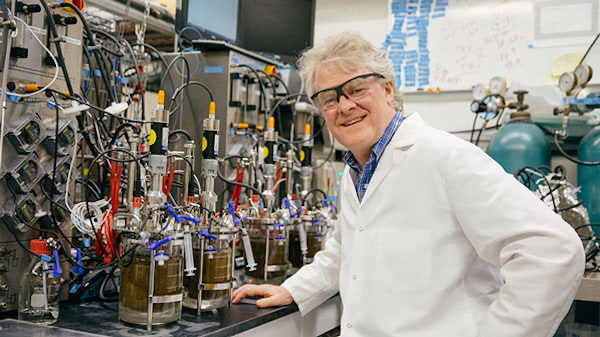- Undergraduate
Bachelor's Degrees
Bachelor of ArtsBachelor of EngineeringDual-Degree ProgramUndergraduate AdmissionsUndergraduate Experience
- Graduate
Graduate Experience
- Research
- Entrepreneurship
- Community
- About
-
Search
All Thayer News
BESC sees mission success with combined microbe, milling biomass processing
Jun 06, 2017 | Oak Ridge National Laboratory
With the successful demonstration of a cheaper, more effective method of biomass deconstruction and conversion using a naturally occurring microbe and a standard milling practice, researchers from the Department of Energy’s BioEnergy Science Center (BESC) have taken a giant step closer to fulfilling key aspects of their mission to create new methods of improving biofuel yields from non-food plant sources.
Led by Professor Lee Lynd and colleagues at Dartmouth and involving investigators from Oak Ridge National Laboratory, the National Renewable Energy Laboratory, the University of California at Riverside, and Argonne National Laboratory, the BESC team recently produced journal articles that represent a significant advancement in research on overcoming recalcitrance—the natural resistance of plants to being broken down to simple sugars that can be fermented for biofuels. BESC’s mission is to enable a sustainable cellulosic biofuels industry by developing ways to remove recalcitrance as an economic barrier to cost-effective biofuels production...
...Lynd said that "by using naturally-occurring cellulolytic microbes in combination with milling, we've shown we can ferment the carbohydrates in cellulosic biomass without the two things that make current technology expensive: thermochemical pretreatment and enzymes." ...
..."Our results assume future research progress, and thus should be regarded as speculative and not yet ready to take to the bank," Lynd said. "With that acknowledged," he continued, "I've been in this field a long time, and I've never before seen a new technology that offers an 8-fold reduction in payback period." The BESC team's new, simpler technology is projected to be economical at a much smaller scale than current technology, which means processing plants could be built faster and sited more easily than current technology, with benefits potentially flowing to rural communities where the crops are grown and processed.
Another advantage of the new process is that solid lignin residue left over after biological processing is less chemically modified and thus potentially more easily converted into other chemical or fuel byproducts, Lynd noted.
Link to source:
https://www.ornl.gov/content/besc-sees-mission-success-combined-microbe-milling-biomass-processing
For contacts and other media information visit our Media Resources page.

